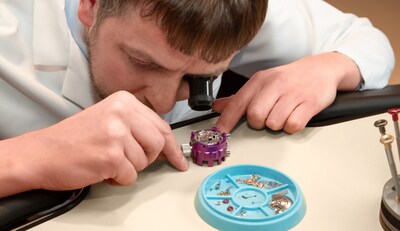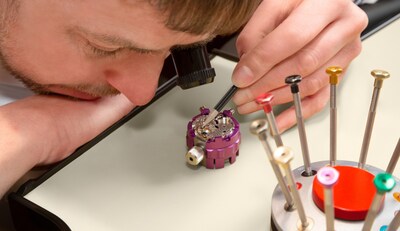Journey of a watchmaker: Interview with Lee Garlick

At the Watches of Switzerland Group, we are proud to be at the forefront of luxury watch retail. What some clients may not know is that there is also exceptional craftsmanship happening behind the scenes where our Rolex-trained watchmakers dedicate their skills to keeping your cherished timepiece performing at its best.
In this series, we delve into the world of watchmaking with some of our in-house experts, who explain how they came to work in the industry and share valuable insights on their craft. For this piece, we spoke to Lee Garlick about his journey from curious enthusiast to experienced watchmaker at the new flagship Rolex Boutique on Old Bond Street.
Could you tell us how you became a watchmaker, and what first sparked your interest in watchmaking?
I had an interest in mechanical clocks from a fairly young age, and that eventually expanded to watches. I would take them apart and try to put them back together – I even got them working again sometimes! It was some years later that I discovered there were training courses in horology in the UK, and so I took a three-year college course in Manchester, training in both clocks and watches.
Are there any milestones or moments in your career that have shaped you as a watchmaker?
Thinking back, the first milestone would be when I graduated from Manchester City College in 2000 and became a qualified member of the British Horological Institute after my three years of training. The next moment would be passing the first level of Rolex training in 2005, that was the beginning of my journey with the Rolex brand that continues to the present day.
How did you come to work at the new Rolex Bond Street showroom?
I joined Watches of Switzerland in London in 2007 and spent time working at the Royal Exchange store, followed by the flagship store on Regent Street. Today, I'm privileged to work alongside a select team of watchmakers at the newly opened Rolex Boutique on Old Bond Street. The working environment and the quality of the work that we see daily has continued to inspire my passion for watchmaking.
You must have seen the watchmaking industry evolve over the years. Is the art of watchmaking changing with the arrival of new technology?
I believe there is a greater appreciation for the art of watchmaking now than maybe there was 20 or 30 years ago. People in general are more knowledgeable about the intricacies of the craft and the watches they own. The evolution of the industry has taken the form of increasingly complex watches and the use of new materials and techniques in production. While new technology certainly has its place, there is impressive innovation happening every year with traditional mechanical watches that are continuing to push the boundaries of what is possible, including through new patents.
You must have worked on countless watches over the years. Are there any particular timepieces that stand out as especially challenging to work on?
I would say that Chronograph models are the most challenging to work on due to their complexities, the number of parts involved, and the adjustments required for correct functioning. Last September, I was trained on Chronograph Daytonas’, so I’m looking forward to working on more of these watches in our in-house workshop in the Old Bond Street boutique.
What does a typical day at the Old Bond Street Service Centre look like for you?
The biggest difference for us now is that watchmakers are working as part of a team. Previously, there may be a single watchmaker, whereas we are now looking at different ways of working to improve efficiency and service production. For example, we are fortunate to have a dedicated polisher on site for case work and restoration, which allows the watchmakers to focus on servicing movements.
What qualities or skills do you believe are essential for someone to excel in this profession, and do you have any advice for someone starting out?
The greatest single skill required in this profession – apart from the necessary dexterity to handle small parts – is patience. This applies to both the time it takes to train as a watchmaker, and the day-to-day work at the bench. A watchmaker also needs to be precise and methodical in the way they work to achieve good results. If I could offer any advice to someone starting out, it would be to maintain high standards and achieve good-quality work. Once this is mastered, a watchmaker will find it easier to move on to the more complicated work later.
